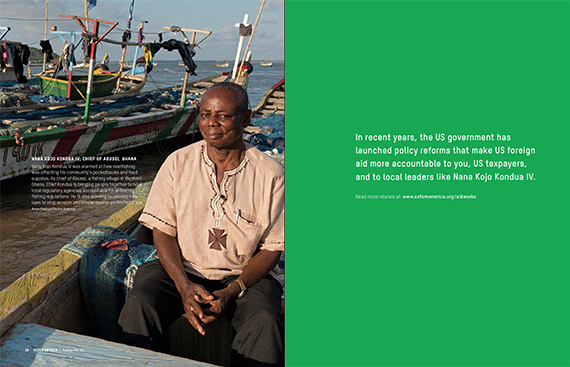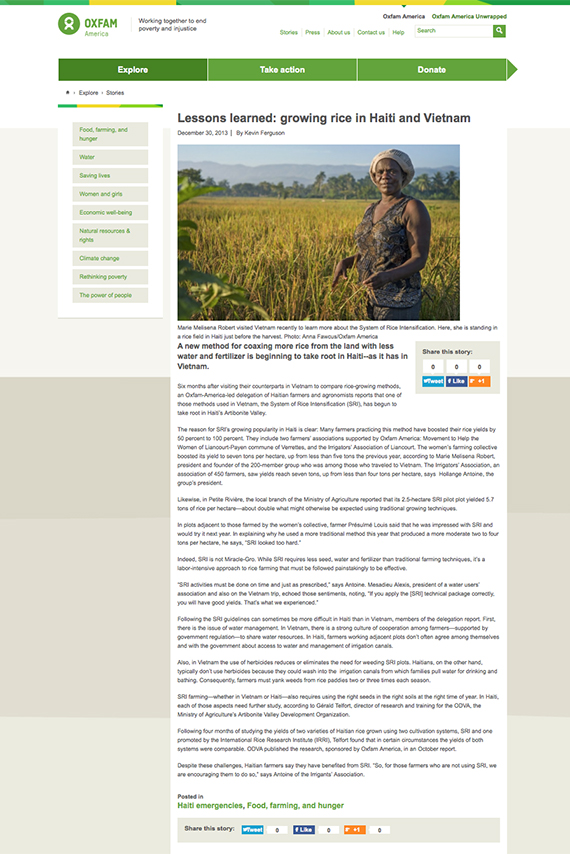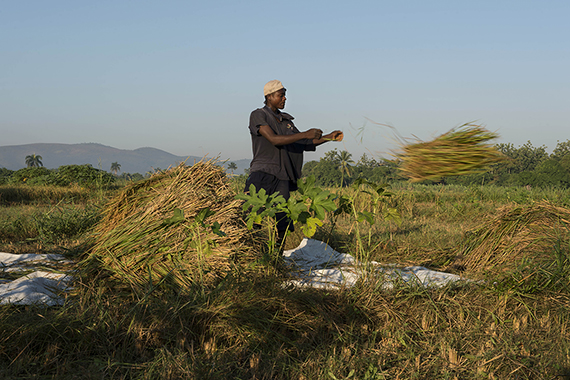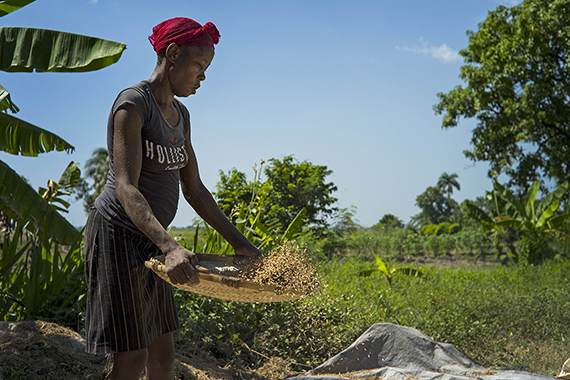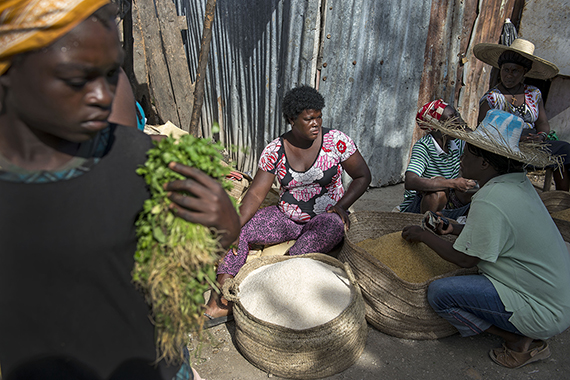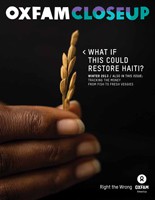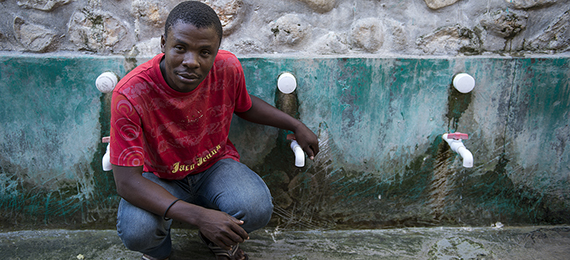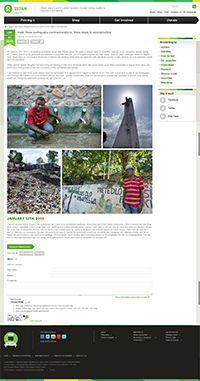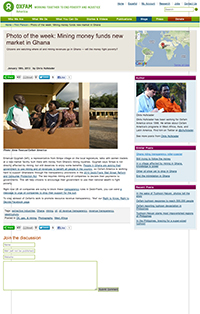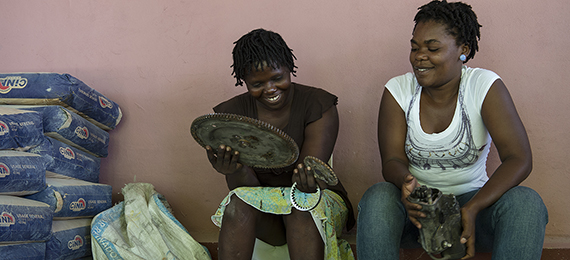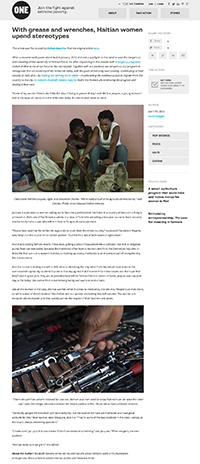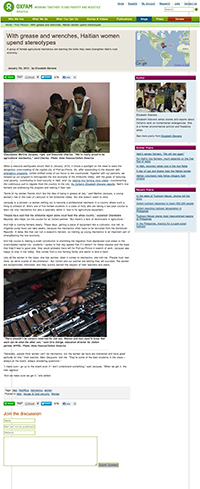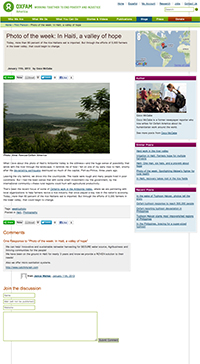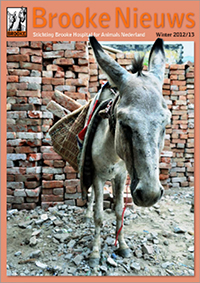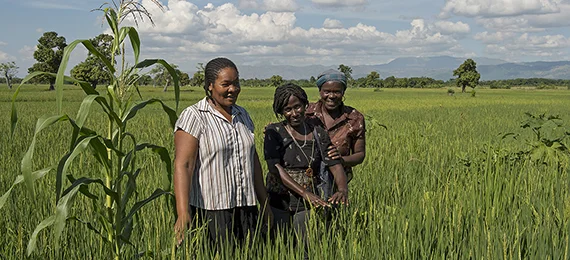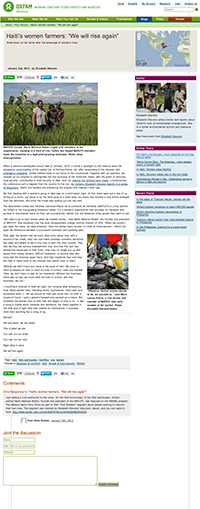One of my photos from my trip to Ghana with Oxfam America is featured towards the end of this interesting publication Foreign Aid 101: A Quick and easy guide to understanding US foreign aid
NGO
Oxfam America; Haitian Rice Farmers Article
A recent article from Oxfam America, called 'In a battle against the bugs, Haitian farmers win, thanks to better coordination' by Kevin Ferguson talks about one of the stories we photographed on assignment in Haiti late in 2013.
Barr Foundation: From Local to Global Publication
A couple of photos from my recent trip to Haiti with Oxfam were published in the Barr Foundation Publication: From Local to Global recently.
Oxfam Canada; Annual Report Cover Photo
One of my photos from my 2012 trip to Haiti with Oxfam is featured as the cover shot of the Oxfam Canada Annual Report 2013:
Oxfam America; Growing Rice in Haiti and Vietnam
Here's an Oxfam America story about Lessons learned: growing rice in Haiti and Vietnam from my most recent assignment in Haiti with writer Kevin Ferguson:
Rice Farmers in Haiti 2013; Assignment with Oxfam America
I have just returned from a week in the Artibonite region of Haiti where I have been working with Oxfam America to document the rice industry, from the farmers in the fields, through to the mills and markets and even big companies who are buying up large quantities of rice. We spoke with people about all aspects of Haitian rice growing, as well as the USA rice imports and the effect that this has on the local marketplace. I travelled with Kevin Ferguson who will tell the stories of the people we met on this journey, incorporating my photography and video. Keep an eye on this blog for links through to upcoming Oxfam America blog posts, articles and documentary work over the coming weeks.
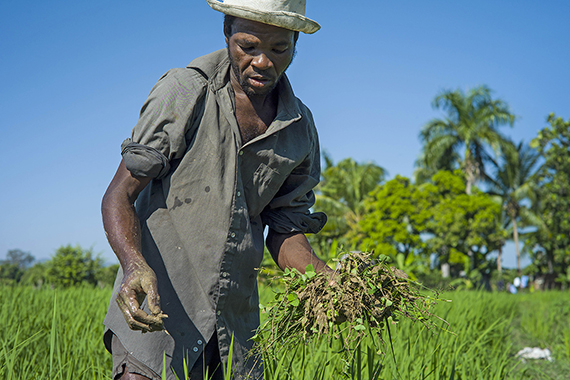
© AnnaFawcus/Oxfam America Rice Farming in Artibonite, Haiti 2013
© AnnaFawcus/Oxfam America Rice Farming in Artibonite, Haiti 2013
© AnnaFawcus/Oxfam America Rice Farming in Artibonite, Haiti 2013
© AnnaFawcus/Oxfam America Rice Farming in Artibonite, Haiti 2013
Working in Zimbabwe with SPANA
I recently spent a week in Zimbabwe working with SPANA. SPANA (the Society for the Protection of Animals Abroad) is a charity for the working animals of the world, with clinics across Africa and the Middle East that treat hundreds of thousands of donkeys, horses, mules, camels and livestock every year. I travelled with the local SPANA mobile veterinary clinc, to the Manicaland Province (some 500km away from Harare), where we camped without luxuries such as electricity. This is what Erick and Andy (the two SPANA veterinarians who I was with) do for at least 2 weeks every month, leaving their families, friends and comforts of home behind so that they can travel to the areas of the country where they are most needed. SPANA provides free veterinary clinics for everyone in these remote communities who wants to come. In many cases, these people would otherwise be very unlikely to have access to this kind of help for their animals. The SPANA staff worked with local VEA's to teach them how to treat the animals, so that they are able to provide assistance in between the mobile clinics visits.
I felt privileged to be involved in documenting the important work that SPANA, and their local partner organizations are doing in Zimbabwe, and wanted to share of few of the photos from the trip:
© Anna Fawcus / SPANA Manicaland Province, Zimbabwe , 2013 © Anna Fawcus / SPANA Manicaland Province, Zimbabwe , 2013 © Anna Fawcus / SPANA Manicaland Province, Zimbabwe , 2013 © Anna Fawcus / SPANA Manicaland Province, Zimbabwe , 2013 © Anna Fawcus / SPANA Manicaland Province, Zimbabwe , 2013 © Anna Fawcus / SPANA Manicaland Province, Zimbabwe , 2013
Case studies, stories and more detailed info from the trip will be published over the coming months through the SPANA website, magazine, blog and other media outlets. I will share links on this blog to where the stories end up. For more information on SPANA and their work, have a look at their website.
Photography Training Workshop with The Brooke in London
I have recently been giving photographic training workshops for a few non-profit organizations, who I normally shoot for. This week I've been in London, and one of the workshops I have been giving over the past few days was with The Brooke. The workshops cover the basics in photography, from teaching local staff about camera settings through to composition and lighting techniques, combined with story-telling and lessons on how to construct case studies. Whilst professional photography is great, it is simply not possible all the time, especially in the field in remote locations where expense and accessibility can be obstacles with having a professional there as often as photography is needed. The Brooke recognize that it is important for their staff in the field to be able to document the day-to-day projects and case studies, and through this training, we work together to better equip them to present compelling photographs of the incredibly important work that the Brooke team are doing around the world. The Brooke is an international animal welfare organisation committed to improving the lives of working horses, donkeys, mules and their owners. To read more about the work that they do, or to view some of the photographs I have taken with them in the past, check out their website.
Photography Training Workshop in London with SPANA
On this trip to London, I have been involved with presenting a couple of photographic training workshops for NGO's who I shoot for. I was in at the SPANA office this week, teaching the staff the basics of photography, from settings through to composition and lighting techniques. Whilst professional photography has its place, it is simply not practical or possible all the time for any non-profit organization. This is why we have been working together to train their staff for the day-to-day documentation of the incredible work they do across the world. SPANA (the Society for the Protection of Animals Abroad) is the charity for the working animals of the world. To learn more about the work that they do, check out their website.
Asian Elephants: Journey to Freedom
I recently visited the Elephant Nature Park in the north of Thailand, just north of Chiang Mai. These photographs endeavor to capture the spirit of these loveable giants, and to entice the viewer to ask questions about the ethics of allowing these animals to become extinct in the wild, only to exist in a domestic role to serve humans. Their journey to freedom begins with awareness of their future. These intelligent creatures live in family groups and will go to extraordinary lengths to protect one another. Their emotions and relationships are similar to humans, forming strong bonds and friendships. Despite the appearance of having thick skin, they in fact are very sensitive animals. There are many parallels between elephants and humans. Yet, humans have become the key reason for extinction that now faces these amazing animals.
In Thailand poaching is not the only enemy of these ancient creatures. Today, wild elephants struggle to find the basic necessities of life as protected land diminishes and many are captured to become domestic working elephants. The booming Thai elephant tourist industry puts yet another high price tag on the head of young elephants, who are brutally trained with pain and fear to make them perform. Their plight falls mainly on deaf ears.
Every day, wild baby elephants are captured and taken away from their mothers (who are often killed) and forced to undergo a torturous training to domesticate them. This practice essentially breaks the spirit of the elephant, using fear of pain to train them to accept riders on their backs, perform tricks and paint. However, ENP provides a sanctuary for these creatures broken by tourism and the illegal logging industry. At ENP, there are no tricks. There are no rides. No elephant paintings can be bought. Here, these elephants are allowed to live their lives free from bullhooks, free from abuse. Elephant Nature Park offers the chance to interact with elephants without exploiting them.
© Anna Fawcus 2013 "Jokia" at Elephant Nature Park
© Anna Fawcus 2013 "Hope" at Elephant Nature Park
© Anna Fawcus 2013 "Faa Mai" at Elephant Nature Park
© Anna Fawcus 2013 "Lucky" at Elephant Nature Park
© Anna Fawcus 2013 "Navann" at Elephant Nature Park
© Anna Fawcus 2013 "Faa Sai" at Elephant Nature Park
If you want to get involved to help Asian elephants find their way to freedom, get in touch with Save Elephant Foundation where there are many ways you can help, from writing letters as an elephant activist, volunteering in one of the programs, or making a donation. If you are visiting Thailand as a tourist, refrain from supporting the numerous elephant camps who are offering elephant rides, paintings and circus tricks and support an organization like Elephant Nature Park where you are part of the solution not the problem.
Oxfam America Video: In Ghana, a call for transparency
This video (featuring some of my photographs) tackles the question of financial transparency in Ghana. Boakye Dankwa Boadi, a representative of a prominent human rights and environmental organization in Ghana asks what exactly oil companies in Ghana are trying to hide and calls for transparency. He calls on the American Petroleum Institute to drop its court case to block the payment transparency provisions in the Dodd-Frank Wall Street Reform and Consumer Protection Act.
"The efforts of Mr. Boadi and others in Ghana to promote transparency and responsible governance are under threat. He sees legislation like Dodd-Frank as a measure that will help them check the money coming in to the government with payments reported by the companies themselves. He says this will help Ghana “cross the path of poverty” to becoming a more developed nation." - Chris Hufstader
Link to Oxfam America blog post by Chris Hufstader
http://www.youtube.com/watch?v=e3BSPqJkwdI&feature=player_embedded&noredirect=1
To add your voice to the Oxfam America petition calling for transparency:http://www.oxfamamerica.org/big-oil
Sure We Can: Canning in NYC
In New York State and particularly New York City, some who are homeless manage to scrape together a meager living by collecting and redeeming others’ discarded cans and bottles. This work has come to be known as “canning.”
Canning can be so demanding physically, demeaning emotionally, and even logistically complicated that many of New York’s homeless are effectively barred from taking advantage of the opportunity. Sure We Can was founded by a small group of concerned New York City residents, including Eugene Gadsden and Ana Martinez de Luco. The organization not only provides opportunities for the City’s destitute but also encourages their self-dependence and responsibility. Based in Brooklyn, this homeless-friendly redemption center has created a welcoming community. At its very core, Sure We Can is not just for canners. It is the canner community.
For more information on Sure we can, please visit their website or you can watch a short video with information about the organization. These photographs document a community of people on the streets of New York City with a ‘can do’ attitude, who work with pride and determination, against the odds:
King Of Cans
©AnnaFawcus
Recycling Depot
©AnnaFawcus
In The Shadows
©AnnaFawcus
Counting Cans
©AnnaFawcus
Into The Night
©AnnaFawcus
City Streets
©AnnaFawcus
Oxfam America Magazine: Winter 2013
The latest Oxfam America Magazine is out, and features many photos from my recent assignments in Ghana and Haiti, including the cover shot, which is one of the photographs I took when we were documenting the rice farming in Artibonite, Haiti.
Here's the link to view it online:
http://www.oxfamamerica.org/
Columbia University School of Journalism: Advanced Multimedia Workshop
The Introduction to Digital Media Storytelling Workshop at Columbia University School of Journalism in New York was so fantastic that I felt compelled to book in for the Advanced Multimedia Workshop. During this workshop, we worked on putting together a short (10 minute or under) video to tell a story. My project was a documentary of local non-profit organization, Sure We Can, based in Brooklyn, New York. Sure We Can is a redemption centre for canners around the city to bring their cans for recycling and to collect the deposit on bottles and cans. For many homeless people, and others, this is a full time job and how they make their living. This video tells a little about the lifestyle of canning, and documents the story of how this organization was successfully formed by the canners themselves.
Enjoy!
http://www.vimeo.com/annafawcus/surewecan
Oxfam Ireland Article: Haiti: three earthquake commemorations, three steps in reconstruction
A recent article on the Oxfam Ireland website features some of the photos that I took recently on assignment in Haiti, for the 3 year commemoration of the earthquake:
Oxfam America: Photo of the Week from Ghana
Oxfam America's photo of the week is a blog post by Chris Hufstader: Mining money funds new market in Ghana. Citizens are watching where oil and mining revenues go in Ghana — will the money fight poverty? This is one of the photographs from my recent trip to Ghana with Chris and the Oxfam America team.
Oxfam America Article: With grease and wrenches, Haitian women upend stereotypes
The website One shared an Oxfam America blog post by Elizabeth Stevens, with photographs from my recent trip to Haiti:
Here's the link to the original blog post on the Oxfam America First Person Blog:
Oxfam America Photo of the week: Artibonite Valley, Haiti
The Oxfam America Photo of the Week is one of the photos that I took recently in Haiti. It is accompanied with a blog post by Coco McCabe: In Haiti, a valley of hope. Today, more than 80 percent of the rice Haitians eat is imported. But through the efforts of 5,000 farmers in the lower valley, that could begin to change.
http://firstperson.oxfamamerica.org/2013/01/11/photo-of-the-week-in-haiti-a-valley-of-hope/
The Brooke News Winter 2012/13
Some of my photographs from India and Nepal are featured in the Brooke News Magazine Winter 2012/13:
Oxfam America Article: Haiti's women farmers: "We will rise again"
There is a new article on the Oxfam America First Person Blog, by Elizabeth Stevens, from our recent trip to Haiti: Haiti's women farmers: "We will rise again" - Small loans on fair terms alter the landscape of women’s lives

